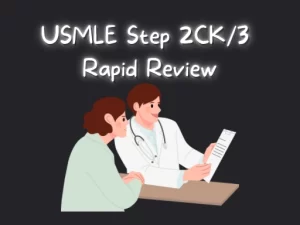The USMLE Step 1 is a crucial exam taken at the end of the second year of medical school, which tests your understanding and application of fundamental scientific concepts learned during the first two years of medical school. USMLE Step 1 total marks are essential in establishing a solid foundation for your safe and competent practice of medicine, both in the present and future.
Importance of USMLE Step 1
The USMLE Step 1 is a requirement for the licensure of medical students in most states, and it is also used by residency programs as a key factor in their selection process. A high USMLE Step 1 passing score can significantly improve a student’s career prospects in the medical field.
The exam tests a student’s knowledge and understanding of basic medical sciences and the exam questions are designed to evaluate a medical student’s comprehension of fundamental concepts and their ability to apply this knowledge in clinical scenarios.
So, it is an important step in a student’s journey to becoming a licensed physician and plays a significant role in determining their future success in the medical field.
USMLE Step 1 Total Marks System
The USMLE Step 1 marking system is based on a three-digit score, with a maximum score of 300 and a minimum passing score of 194. The total marks are calculated based on the number of questions a student answers correctly, with no penalty for incorrect answers.
The three-digit score is used to compare a student’s performance to that of other students who have taken the exam. Percentile rankings are also provided to help students understand how their score compares to others.
The USMLE Step 1 passing score is an important factor in determining a student’s eligibility for medical licensure and residency programs, so it is important to aim for a high score.
Content Categories
The USMLE Step 1 exam consists of seven content categories. Here is a breakdown of each category and the percentage of questions allocated to it:
Systems and Processes: 16-20%
- Basic concepts of the normal human body and the mechanisms underlying health and disease.
- Includes genetics, immunology, microbiology, pharmacology, and physiology.
General Principles: 15-20%
- Basic concepts that apply to different organ systems.
- Includes biostatistics, epidemiology, medical ethics, and nutrition for the USMLE Step 1 total marks.
Immune System: 1-5%
- The structure and function of the immune system and its response to disease.
- Blood and Lymphoreticular Systems: 3-7%.
- The structure and function of the blood and lymphoreticular systems and their response to disease.
Behavioral Health: 4-6%
- The social, psychological, and biological determinants of behavior and the effects of illness on patients and their families.
Nervous System and Special Senses: 9-15%
- The structure and function of the nervous system, including the special senses, and their response to disease.
Musculoskeletal System and Connective Tissue: 3-7%
- The structure and function of the musculoskeletal system and connective tissue and their response to disease.
These percentages of USMLE step 1 total marks may vary slightly from one exam to another, but they generally provide a good idea of the relative importance of each category in the exam.
Test Content
The USMLE Step 1 is a computer-based exam that consists of multiple-choice questions. Here’s a breakdown of the test format, type of questions, and duration:
- Test Format: It is a one-day exam that consists of seven 60-minute blocks of questions. Each block contains up to 40 questions, for a total of up to 280 questions.
- Type of Questions: MCQ’s are asked with four answer choices per question. Some questions may have multimedia content, such as videos, images, or audio clips.
- Duration: The total testing time is approximately 8 hours, including breaks. There is a 45-minute break after the third block and a 15-minute break after the remaining blocks.
Things to Consider Before Taking the USMLE Step 1 Exam
Here are some essential things to know before taking the USMLE Step 1 exam:
- Familiarize yourself with USMLE Step 1 total marks and develop effective study strategies.
- Create a proper study plan.
- Use high-quality study resources and other study materials.
- Take care of your physical and mental health to perform well.
- Know the exam day rules and procedures and read the USMLE Bulletin of Information for further guidance.
Subjects Included in the USMLE Step 1 Program
| Anatomy | Behavioural sciences |
| Biochemistry | Biostatistics and epidemiology |
| Genetic | Ageing |
| Molecular and cell biology | Microbiology |
| Pathology | Pharmacology |
| Physiology | Immunology |
| Nutrition |
Conclusion
When answering test questions in the Step 1 exam, it is advisable to thoroughly prepare and understand the USMLE Step 1 total marks, this can increase the chances of achieving a high score and successfully continue on your path towards a career in medicine.





